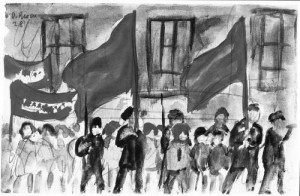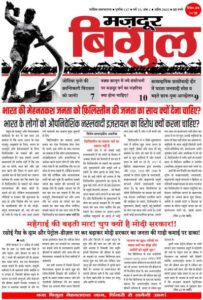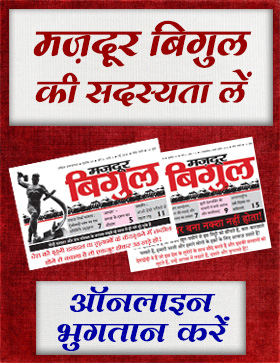Table of Contents
कहानी
पारमा के बच्चे
मक्सिम गोकी
For English version of this story, please scroll down
जिनोवा में रेलवे स्टेशन के सामने वाले छोटे-से चौक में लोगों की भारी भीड़ जमा थी। उनमें अधिकतर मज़दूर थे, लेकिन बढ़िया कपड़े पहने और सम्पन्न तथा खाते-पीते लोग भी उनमें शामिल थे। नगरपालिका के सदस्य इस भीड़ में सबसे आगे थे। इनके सिरों के ऊपर रेशमी धागों से बड़े कलात्मक ढंग से कढ़ा हुआ नगर-ध्वज फहरा रहा था। पास ही में मज़दूर-संगठनों के रंग-बिरंगे झण्डे हिल-डुल रहे थे। झण्डों के सुनहरे झब्बे, झालरें और तनियाँ तथा ध्वज-डण्डों के धातु से मढ़े हुए बर्छीनुमा सिरे चमचमा रहे थे, रेशम की सरसराहट सुनायी पड़ रही थी, समारोही मनःस्थिति वाली भीड़ का मन्द गायन सहगान की तरह धीमे-धीमे गूँज रहा था।
एक ऊँचे चबूतरे पर कोलम्बस की मूर्ति भीड़ के ऊपर खड़ी थी, उसी कोलम्बस की मूर्ति जिसने अपने विश्वासों के लिए बहुत दुख-दर्द सहे और विजयी भी इसलिए हुआ कि उनमें विश्वास करता था। इस समय भी वह नीचे खड़े लोगों की ओर देख रहा था और अपने संगमरमर के होंठों से मानो यह कह रहा थाः
“केवल विश्वास करने वाले ही विजयी होते हैं।”
बाजे बजाने वाले काँसे-ताँबे के अपने बाजे चबूतरे के गिर्द मूर्ति के कदमों में रख दिये थे और वे धूप में सोने की तरह चमक रहे थे।
पीछे की ओर ढालू अर्द्ध-चन्द्राकार स्टेशन की संगमरमर की, भारी-भरकम इमारत ऐसे अपनी भुजाएँ फैलाये खड़ी थी मानो लोगों को अपनी बाहों में भर लेना चाहती हो। बन्दरगाह की ओर से भाप-चालित जहाज़ों की भारी फक-फक, पानी में प्रोपेलर की दबी-घुटी आवाज़, जंजीरों की छनक, सीटियाँ और चीख़-चिल्लाहट सुनायी दे रही थी। चौक में शान्ति थी, उमस थी और वह तेज़ धूप से तप रहा था। घरों के छज्जों और खिड़कियों में औरतें फूल लिये खड़ी थीं तथा उनके पास ही पर्व-त्यौहारों के अवसरों की तरह सजे-धजे और फूलों की तरह प्रतीत होने वाले बच्चे खड़े थे।
स्टेशन की ओर बढ़े आ रहे इंजन ने सीटी बजायी, भीड़ हरकत में आयी, मुड़े-मुड़ाये हुए अनेक टोप काले पक्षियों की भाँति हवा में उछल गये, बजवइयों ने बाजे उठा लिये, कुछ गम्भीर और अधेड़ उम्र के लोग अपने को ठीक-ठाक करके आगे आये, उन्होंने लोगों की ओर मुँह किया और हाथों को दायें-बायें हिलाते-डुलाते हुए भीड़ से कुछ कहने लगे।
धीरे-धीरे और मुश्किल से हटते हुए लोगों ने सड़क पर चौड़ा रास्ता बना दिया।
“किसका स्वागत किया जा रहा है?”
“पारमा नगर के बच्चों का।”
पारमा में हड़ताल चल रही थी। मालिक लोग झुकने को तैयार नहीं थे, मज़दूरों के लिए स्थिति बड़ी कठिन हो गयी थी और इसलिए उन्होंने अपने बच्चों को, जो भूख के कारण बीमार होने लगे थे, जिनोवा में अपने साथियों के पास भेज दिया था।
रेलवे स्टेशन के स्तम्भों के पीछे से बालकों का एक सुव्यवस्थित जुलूस बढ़ा आ रहा था। वे अधनंगे थे और अपने चिथड़ों में झबरीले, अजीब जानवरों की तरह झबरीले-से लग रहे थे। वे पाँच-पाँच की कतारें बनाये और एक-दूसरे के हाथ थामे हुए चले आ रहे थे-बहुत ही छोटे-छोटे धूल-मिट्टी से लथपथ और शायद थके-हारे। उनके चेहरे गम्भीर थे, किन्तु आँखों में सजीवता और निर्मलता की चमक थी और जब बैण्ड ने गैरीबाल्डी स्तुतिगान की धुन बजायी दुबले-पतले, तीखे और क्षुधा-पीड़ित चेहरों पर ख़ुशी की लरह-सी दौड़ गयी, उल्लासपूर्ण मुस्कान खिल उठी।
भीड़ ने भविष्य के इन लोगों का बेहद शोर मचाते हुए स्वागत किया, उनके सम्मुख झण्डे झुका दिये गये। बच्चों की आँखों को चौंधियाते और कानों को बहरे करते हुए बाजे खूब जोरों से बज उठे। ऐसे जोरदार स्वागत से तनिक स्तम्भित होकर घड़ी भर को वे पीछे हटे किन्तु तत्काल ही सँभल गये, मानो लम्बे हो गये, घुल-मिलकर एक शरीर बन गये और सैकड़ों कण्ठों से, किन्तु मानो एक ही छाती से निकलती आवाज में चिल्ला उठेः
“इटली ज़िन्दाबाद!”
“नव पारमा नगर ज़िन्दाबाद!” बच्चों की ओर दौड़ती हुई भीड़ ने ज़ोरदार नारा लगाया।
“गैरीबाल्डी ज़िन्दाबाद!” भूरे पच्चड़ की भाँति भीड़ में घुसते और उसी में लुप्त होते हुए बच्चे चिल्लाए।
होटलों की खिड़कियों में और घरों की छतों पर सफेद परिन्दों की तरह रूमाल हिल रहे थे, वहाँ से लोगों के सिरों पर फूलों की बारिश हो रही थी और ऊँची-ऊँची आवाज़ें सुनायी दे रही थी।
सभी कुछ समारोही बन गया, सभी कुछ में सजीवता आ गयी, भूरे रंग का संगमरमर तक किरण-बिन्दुओं से खिल उठा।
झण्डा लहरा रहे थे, टोप-टोपियाँ और फूल हवा में उड़ रहे थे। वयस्कों के सिरों के ऊपर बच्चों के छोटे-छोटे सिर दिखायी देने लगे, लोगों का स्वागत करते और फूलों को लोकते हुए बच्चों के छोटे-छोटे, गन्दे-मैले हाथ झलक दिखाने लगे और हवा में ये नारे लगातार ऊँचे-ऊँचे गूँज रहे थेः
“समाजवाद ज़िन्दाबाद!”
“इटली ज़िन्दाबाद!”
लगभग सभी बच्चों को गोद में उठा लिया गया था, वे वयस्कों के कन्धों पर बैठे थे, कठोर से प्रतीत होने वाले मुच्छल लोगों की चौड़ी छातियों से चिपके हुए थे। शोर-शराबे, हँसी-ठहाकों और हो-हल्ले में बैण्ड की आवाज़ मुश्किल से सुनायी दे रही थी।
शेष रह गये बालकों को लेने के लिए नारियाँ भीड़ में इधर-उधर भाग रही थीं और एक-दूसरी से कुछ इस तरह के प्रश्न कर रही थीं:
“अन्नीता, तुम तो बच्चे ले रही हो न?”
“हाँ। आप भी ?”
“लँगड़ी मार्गारीता के लिए भी एक बच्चा ले लेना…”
सभी ओर उल्लासपूर्ण और पर्व के रंग में रंगे हुए चेहरे थे, दयालु और नम आँखे थीं और कहीं-कहीं हड़तालियों के बच्चे रोटी भी खाने लगे थे।
“हमारे वक़्तों में किसी को यह नहीं सूझा!” चोंच जैसी नाक और दाँतों के बीच काला सिगार दबाये हुए एक बूढ़े ने कहा।
“और कितना सीधा-सादा उपाय है…”
“हाँ! सीधा-सादा और समझदारी का।”
बूढ़े ने मुँह से सिगार निकाला, उसके सिरे को गौर से देखा और आह भरकर राख झाड़ी। इसके बाद पारमा के दो बच्चों को, जो शायद भाई थे, अपने निकट देखकर ऐसी भयानक-सी सूरत बना ली मानो उन पर हमला करने को तैयार हो। बच्चे गम्भीर मुद्रा बनाये उसकी तरफ देख रहे थे। इसी समय उसने टोपी आँखों पर खींच ली और हाथ फैला दिये। बच्चे माथे पर बल डालकर कुछ पीछे हटते हुए एक-दूसरे के साथ सट गये। बूढ़ा अचानक उकडू़ँ बैठ गया और उसने मुर्गे से बहुत मिलती-जुलती आवाज़ में ज़ोर से बाँग दी। नंगे पैरों को पत्थरों पर पटकते हुए बच्चे खिलखिलाकर हँस दिये। बूढ़ा उठा, उसने अपना टोप ठीक किया और यह मानते हुए कि अपना कर्त्तव्य पूरा कर दिया है, लड़खड़ाते पैरों पर डोलता हुआ वहाँ से चल दिया।
पके बालोंवाली एक कुबड़ी औरत, जो चुड़ैल बाबा-यागा जैसी लगती थी और जिसकी हड़ीली ठोड़ी पर कड़े, भूरे बाल थे, कोलम्बस की मूर्ति के पास खड़ी थी और अपनी बदरंग शाल के पल्लू से, रोने के कारण लाल हुई आँखों को पोंछ रही थी। इस उत्तेजित भीड़ में यह काली-काली और बदसूरत औरत अजीब ढंग से अकेली-सी प्रतीत हो रही थी…
जिनोआ की काले बालोंवाली एक औरत सात साल के एक बच्चे की उँगली थामे हुए थिरकती-सी चली जा रही थी। बालक खड़ाऊँ और कन्धों को छूता हुआ भूरे रंग का टोप पहने था। वह टोप को गुद्दी पर करने के लिए सिर को पीछे की ओर झटकता था, लेकिन वह फिर से चेहरे पर आ जाता था। औरत ने लड़के के छोटे-से सिर से उसे उतारकर कुछ गाते तथा हँसते हुए हवा में लहराया, बेहद खुश लड़का सिर ऊपर की ओर करके टोप को देखता रहा, फिर उसे पकड़ने के लिए उछला और फिर ये दोनों आँखों से ओझल हो गये।
बड़ी-बड़ी नंगी भुजाओंवाला लम्बा-तड़ंगा व्यक्ति, जो चमड़े का पेशबन्द बाँधे था, भूरे रंग की चुहिया जैसी छह वर्षीया बालिका को कन्धे पर बिठाये था। उसने आग की लपट जैसे लाल बालोंवाले लड़के की उँगली थामे हुए अपने निकट जाती औरत से कहाः
“समझती हो न, अगर हमारे इस ढंग ने गहरी जड़ जमा ली… तो हमें जीतना मुश्किल होगा। ठीक है न?”
इतना कहकर उसने ज़ोरदार, ऊँचा और विजयी ठहाका लगाया और अपने हल्के-से बोझ को नीली हवा में उछालकर नारा लगायाः
“पारमा ज़िन्दाबाद!”
बच्चों को उठाये या उनके हाथ थामे हुए लोग चले गये और चौक में रह गये कुचले-मुरझाये फूल, टॉफियों के कागज और प्रफुल्ल हमालों के दल और उनके ऊपर थी नयी दुनिया को खोजनेवाले उदात्त व्यक्ति की मूर्ति।
और सड़कों पर से नवजीवन की ओर बढ़ते लोगों की प्रसन्नतापूर्ण ऊँची-ऊँची आवाज़ें ऐसे सुनायी दे रही थीं मानो बहुत बड़े-बड़े बिगुल बज रहे हों।
Story
Childrens of Parma
Maxim Gorky
In Genoa, on the little square in front of the station, a tightly-packed crowd of people are assembled. Workmen predominate, but many well-dressed, well-nourished persons are also present. At the head of the crowd stand the members of the municipal administration. The heavy banner of the town, artistically embroidered in silk, floats in the air, and beside it wave the many-coloured banners of the Labour organisations. The gold shimmers on the tassels, fringes, knots, and on the ends of the banner-poles, the silk rustles, and the mass of people, in solemn mood, murmur like a choir singing in an undertone.
Above them, on a high pedestal, towers the fine figure of Columbus, the dreamer who suffered so much because he believed, and—gained the victory because he believed. And he still looks down upon mankind as though his marble lips would say:—
“Only those gain the victory who believe.”
At his feet, round the pedestal, the musicians have deposited their brazen trumpets, and the brass shines in the sun like pure gold.
The heavy marble house of the station stands in a concave hall-circle, and has spread out its wings as though to embrace humanity. Through the portal the loud panting of the locomotives teaches the ear, the rattling of chains, whistles, cries; but on the square, flooded with burning sunlight, it is still and oppressively hot. On the verandahs and at the windows of the houses stand half-dressed women with flowers in their hands, and children dressed as for a fete, looking like flowers themselves.
A whistle from the engine approaching the station. There is a movement in the crowd. Like blackbirds some hats go up in the air, the musicians seize their instruments, some of the older, more serious men step to the front, turn their faces to the crowd, and give some order, motioning with their hands towards each side.
Heavily and slowly the crowd draws aside, leaving a broad pathway free to the street.
“Whom are they receiving here?”
“The children from Parma.”
There, at Parma, the workers are on strike. The employers do not give in, the position of the workmen became daily more difficult. They therefore got together their children, who were already beginning to sicken with hunger, and sent them to their comrades in Genoa.
From behind the station’s rows of pillars there emerges a strange procession of little people: they are only half-clothed, and look in their rags like shaggy, odd little animals. They walk in rows of five abreast, holding each other tightly by the hand small, dusty, visibly tired. Their faces are solemn, but their eyes are shining, clear, and lively; and as the music breaks forth in their honour with the “Garibaldi Hymn” a bright, contented smile passes over these thin, peaked, hungry faces.
The crowd greets these people of the future with a deafening roar, the banners droop before them, the trumpets blare. The children are a little confused by this reception; for a moment they shrink back, but then all at once they close up their ranks, forming themselves into a solid body, and with hundreds of voices, which come as if from one breast, give vent to the cry:—
“Long live Italy!”
“Long live the youth of Parma” drones the multitude, falling upon them. “Hurrah for Garibaldi!” cry the children, cutting like a grey wedge in among the crowd and disappearing there.
At the windows of the hotel, on the roofs of the houses, countless handkerchiefs flutter like white birds; a rain of flowers pours down thence on the heads of the crowd, loud, merry cries are heard.
Everything has a festal air, everything seems clad with new life; even the grey marble has blossomed out in gay hues.
The banners wave, hats and flowers fly through the air; over the heads of the grown-ups little children’s heads have appeared; little, dark-shinned claws clutch through the air after the flowers and wave to the crowd, and above everything sounds uninterruptedly the mighty cry:—
“Long live Socialism!”
“Long five Italy!”
Almost simultaneously all the children are lifted up, placed on the shoulders of the grown-up people, or pressed to the breast of some rough-moustached man. The music is hardly audible in the general noise, screams, and laughter. Women appear among the crowd and divide the still remaining children among them. They call to each other:—
“Will you take two, Anita?”
“Yes, indeed, and you too!
“And one for lame Marguerita.”
Everywhere there are signs of joyful excitement, faces with a festal expression, hind, tearful eyes. Here and there the strikers’ children are already nibbling at sweets or eating bread.
“In our time this was not thought of,” said an old man with a beaked nose and a black cigar in his mouth.
“And yet how simple it is!”
“Yes. Simple and reasonable!”
The old fellow took the cigar out of his mouth, examined, the one end, and with a deep sigh shook off the ashes. When directly after he found two of the Parma children close beside him, evidently brothers, he made a fierce face, tilted his hat over his eyes, and opened his arms. The children, first looking solemnly up at him, pressed closer together, and shrunk back with darkening faces. Suddenly the old fellow bent down and began to crow. The children now laughed merrily and jumped about the pavement with their bared legs. But the old man stood up, pulled his hat to rights, and walked off with an uncertain step, evidently of the opinion that he had done all that was necessary.
A hunch-backed, grey-haired woman, with the face of a witch and harsh grey hairs on her bony chin, stands against the pedestal of the Columbus monument and weeps, drying her red-encircled, eyes on the end of a faded shawl. Sombre and malformed, she seems so strangely solitary in this cheerfully excited crowd of people.
With a dancing step a black-haired vegetable woman comes past, leading by the hand a little man of seven years, with wooden shoes on his feet and a hat which reaches to the shoulders on his head.
He shakes his head about to throw the hat back on to his neck, but it keeps slipping over his nose again. The woman pulls the hat off his head, and waving it laughing in the air sings loudly some song or other. The boy watches her, his head thrown back and his whole face full of laughter, and then leaps up to get back his hat, and both disappear in the crowd.
An overgrown man in a leather apron, with bare, enormous arms, holds a six-year-old girl on his shoulder, and says to the woman who walks at his side leading by the hand a boy with fiery red hair:-
“You understand that if this becomes a general custom they will have hard work to get us under, eh?”
And he laughs in a loud, deep, triumphant voice, tossing up his little burden towards the blue sky:-
“Hurrah for Parma!”
The people disperse, carrying or leading the children away with them. On the square there remain only crushed flowers, paper bags emptied of sweets, a merry group of blue-clad porters, and above them the noble figure of the man who discovered the new world.
But from the streets which, like enormous tubes, converge on the square, sound the merry cries of the people who are going towards the new life.
‘मज़दूर बिगुल’ की सदस्यता लें!
वार्षिक सदस्यता - 125 रुपये
पाँच वर्ष की सदस्यता - 625 रुपये
आजीवन सदस्यता - 3000 रुपये
आर्थिक सहयोग भी करें!
 बुर्जुआ अख़बार पूँजी की विशाल राशियों के दम पर चलते हैं। मज़दूरों के अख़बार ख़ुद मज़दूरों द्वारा इकट्ठा किये गये पैसे से चलते हैं।
बुर्जुआ अख़बार पूँजी की विशाल राशियों के दम पर चलते हैं। मज़दूरों के अख़बार ख़ुद मज़दूरों द्वारा इकट्ठा किये गये पैसे से चलते हैं।
मज़दूरों के महान नेता लेनिन










